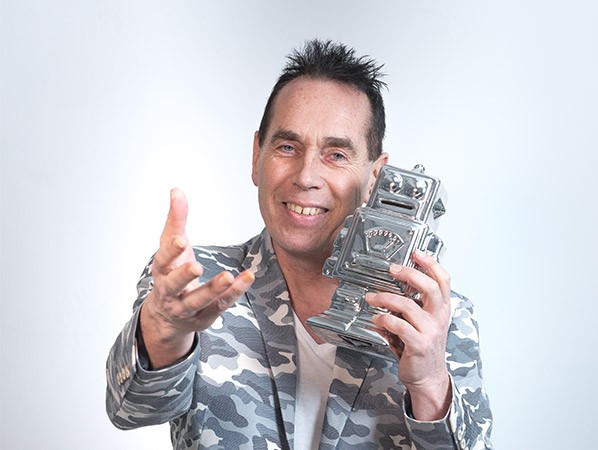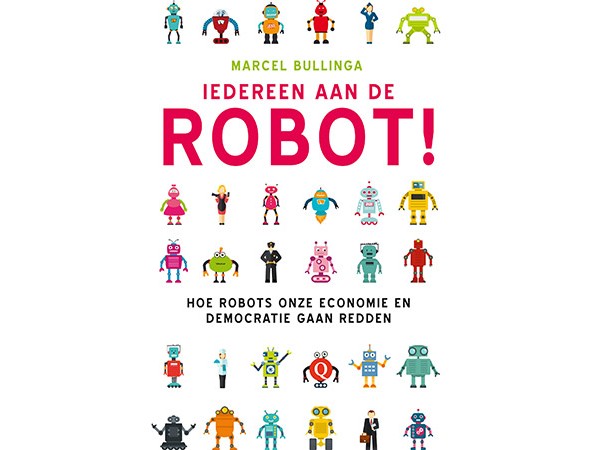
It's still hard to imagine, but in about ten to fifteen years, many people will be largely replaced by robots and artificial intelligence in many organisations. "That is good news! Provided that we take on the development of this robotisation in the right way", says trend watcher and futurologist Marcel Bullinga.
In the next ten to fifteen years, robots are going to turn the world upside down. No industry will be escaping this development, and this includes the food industry. This is what futurologist, publicist, and research journalist Marcel Bullinga predicts. His prediction is the result of years of research on technological developments and the influence they have on our society. Driven by journalistic curiosity, Marcel looks for patterns in society while making use of scientific studies. He can fill plenty of books about his findings. And that is exactly what does.
"In the early 1990s, I was an internet pioneer. I was one of the first to have an internet account and a website. All the available websites we had back then fitted on just one screen. Can you imagine? I remember the feeling that the introduction of the internet gave me: now we can reinvent the world! And today, we can definitely say that the internet has been the starting point for revolutionary changes. Now, twenty-five years later, we are facing new radical changes thanks to the coming of the robot."
"Thanks to robots and artificial intelligence, we may be capable to reinvent the world and the economy. From growth and competition to collaboration and compassion. I consciously emphasise the word 'may' because we will have to utilise the robot in a smart and sensible way."
"The first scenario – the nineteenth-century perspective – is rather grim. We continue with the way we are currently producing and consuming. Robots are in the hands of large tech companies, which are getting richer and richer. If they manage to acquire a monopoly position through robots and artificial intelligence, they will get a hold on all industries in the world. The income inequality will increase further. The economy will get completely overheated. A brighter prospect of the future would be the renaissance perspective. When we, as citizens and entrepreneurs, manage to keep a grip on robotisation ourselves, I predict that robots will make us more autonomous and independent. They are going to take many tasks and work out of our hands, allowing us to focus on the most interesting part of our work. This way, robots can become a wonderful support within your company without you having to fear of losing your job."
"There are three important developments. The first is the disappearing job: jobs that won't exist anymore in fifteen years’ time as they have been taken over by robots. The conveyor belt employee, the postman, the notary, the anaesthetist: in nearly all industries and sectors you see jobs that will disappear in the future. Robots can do this work as well, with a much higher labour productivity. The good news is that, opposite the disappearing job, we will have the future job. There will be an explosion of new jobs where creativity, innovation, persuasiveness, and communication skills are important values. In the future we need creative people who can devise new products, have great social skills, and who can negotiate and persuade. Routine jobs can just as easily be done by robots."
"Also within the food industry, there are jobs that are on the nomination list to disappear. The preparation of food can often be just as well done by robots. They can do this much faster and cheaper than human hands. All factories will be turned into robotised factories, with no exceptions. This is interesting for the industry as it can be extremely cost effective. The employees who work there will have to upgrade themselves to a future job. The American company Amazon is a typical example as it already is a quintessential robotised employer. The percentage of robots they use is only increasing and the number of employees is getting increasingly smaller. We are going towards a situation where people will only have controlling tasks and, besides that, will be working on the further developments of robotisation and artificial intelligence within their branch or organisation."

"The second development is the introduction of the food printer; the symbol of the future of the food industry. This form of robotisation is still in its infancy. Right now, we only have food printers in which you have to put a raw material – for example chocolate – and which will then spit out the same raw material in the shape you desire. That is not what I'm talking about. The food printer of the future is capable to produce a hamburger out of stem cells of animals. Without the need of using an actual animal at all. Additionally, it can take all kinds of diets, allergies, and specific customer needs into account. Children who don't want to eat vegetables? With the food printer, you can make products which they do like and with the same nutrients. The food printer is also capable to fight today's food waste."
'All factories will be turned into robotised factories, with no exceptions'
"The third major development within the food industry for the coming years is transparency. Consumers increasingly want to know more about the provenance of their food. Has it been produced in an honest and sustainable manner? How healthy or unhealthy is the product? As a consumer, you could try to decipher the product labels, but this is impossible to do for most of us. Blockchain – which pools all available data from different databases – will make this much easier in the future. I foresee that, in about ten years’ time, every product will get a colour code or number. The consumer will then be able to see at a glance how sound a products is. This requires more openness and transparency from the food industry.
"The brain of the robot is still heavily under construction. In the future, robots will be much better able to act independently. They can scan an environment and determine what needs to be done. It will make the industrial process much more flexible and cost-effective. Even though robots will increasingly look more and more like humans in their behaviour, they will come in all shapes and sizes. From self-driving cars to nanobots in our bodies, and from a personal robot assistant who makes the social security regulations more understandable to mega-printers that print buildings."
"On the one hand, robotisation offers huge opportunities. Robotised factories make it possible to save costs and increase profits. On the other hand, it forces you to be more transparent about your production processes. To the entrepreneurs in the food industry, I would like to say: start working on co-creation. Together with your staff, make an inventory of what robots can mean for your company. Now and in about fifteen years’ time. What does robotisation mean for the current functions and jobs, and how can employees be retrained? And about transparency: try to visit a start-up business. These young businesses often find that being transparent about their activities is completely self-evident and there may be a lot to learn from them."
"Contrary to the nineteenth-century industrial revolution, the current revolution will not last a hundred years, but only ten. Robots will turn our world upside down in no time at all. It's a development that cannot be stopped, so it is best to use it to your advantage. When we act cleverly, we can maximally profit from our new employees!"
Marcel Bullinga's latest book will be published by Uitgeverij Q in January 2019.
Source: © Boy Hazes